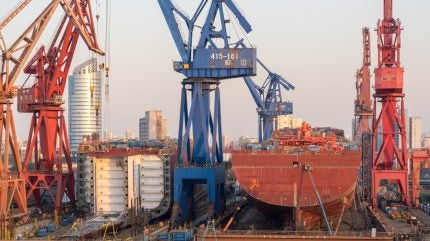China will merge CSSC and CSIC to create shipbuilding giant

China has merged two of its giant state-owned shipbuilding firms to create an RMB 700 billion ($97.4b) company.
China State Shipbuilding Corporation (CSSC) and China Shipbuilding Industry Corporation (CSIC) had previously been one state-owned enterprise (SOE), but were split in 1999. After months of discussions and rumours, the firms were again made one in a ceremony in Shanghai.
The new CSSC will control as much as 21% of the global shipbuilding industry, and Beijing hopes the new megacompany will be a more efficient challenger across the civil, military, and offshore energy sectors. As competition is likely as fierce as it has ever been in the Asian shipbuilding market, the aim of this merger is to cement China’s place above South Korea as the dominant force in the region.
Over the 25 years the shipbuilders have been split into the northern Dalian-based CISC and the southern Shanghai-based CSSC, a domestic rivalry developed, according to China Decoded.
Reducing this internal competition and focusing on growth compared to international rivals is increasingly vital for the Chinese industry as the US has become more assertive in anti-China policies during the second Trump administration.
“This merger marks the largest strategic restructuring in China’s shipbuilding history, aimed at optimising resource allocation and enhancing competitiveness in the global market,” said Xu Yi, an analyst at Haitong Futures told South China Morning Post.
It is understood that Tuesday 12 August will be the final day CSIC shares will be available for market trading on the Shanghai Stock Exchange, before the company is folded into China CSSC Holdings.
The move has several potential downsides for the Beijing government and the new larger company. Firstly, it will almost certainly attract the ire of international anti-monopoly bodies. While these regulators do not have the power to break up the Chinese megafirms, they could recommend countermeasures to other governments which could restrict the business CSSC can do.
The move could also consolidate military and civilian shipyards, which could lead to further international restrictions or tariffs aimed at the industry, such as increased port fees for Chinese vessels, or even higher tariffs.




